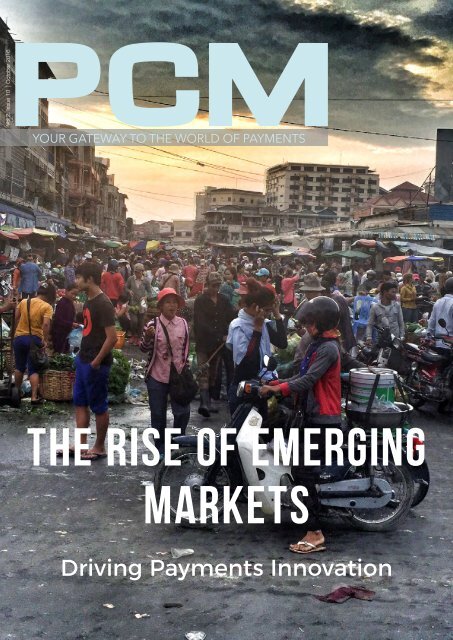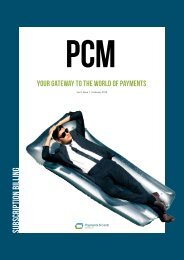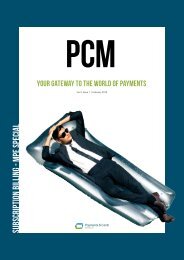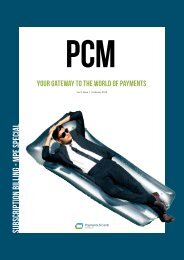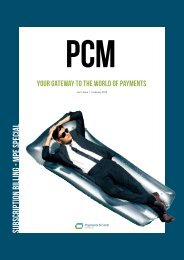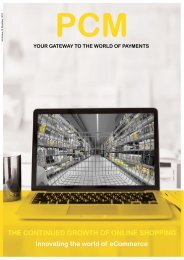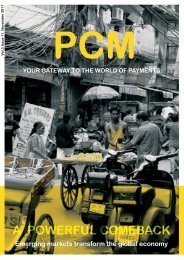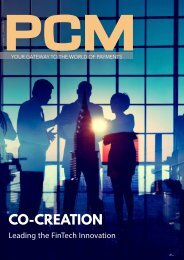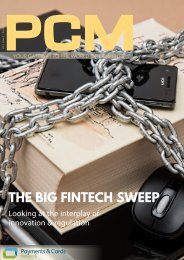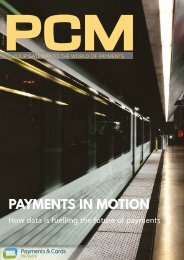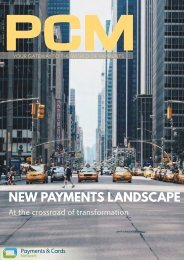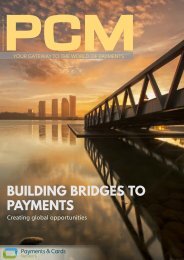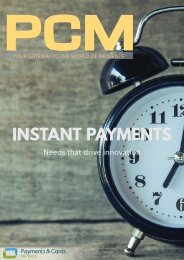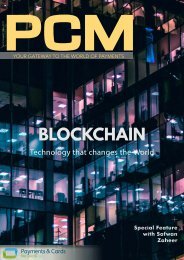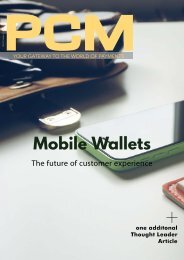PCM Vol.2 - Issue 10
You also want an ePaper? Increase the reach of your titles
YUMPU automatically turns print PDFs into web optimized ePapers that Google loves.
Vol 2. <strong>Issue</strong> <strong>10</strong> | October 2016<br />
<strong>PCM</strong><br />
YOUR GATEWAY TO THE WORLD OF PAYMENTS<br />
the rise of emerging<br />
markets<br />
Driving Payments Innovation
Welcome to <strong>Vol.2</strong> - issue <strong>10</strong><br />
Emerging markets might not seem very exciting to some, but others are already<br />
taking advantage of the opportunities they have to offer. Mario Shiliashki, CEO<br />
@PayU EMEA gives an insight into the regional payments landscape and how<br />
it differs from Western Europe & US, why are emerging markets exciting and<br />
provides advice for companies contemplating expanding into these regions.<br />
Carrying on, Aleksander Kijek, VP of Operations @Nethone, uses the example of Nethone solutions<br />
being applied in the gaming industry to explain how friendly fraud can be effectively prevented<br />
through the use of Machine Learning, User Profiling and Behavioral Analysis.<br />
Shailesh Grover, elaborates on the way of making more money from customers and how to continually<br />
acquire more of them.<br />
Sarah Clark, General Manager Identity @Mitek, talks about the key to a successful digital transformation<br />
and the best ways to leverage the mobile user experience.<br />
For our startup Spotlight this month we interviewed Lukasz Dylag, Founder & CEO @VoicePIN, who<br />
gave us a better understanding on the use of voice biometrics when it comes to authorization and<br />
authentication and how it is becoming an integral part of the identification process.<br />
We also have a Special Feature this month. We interviewed, Jordan Lawrence, Co-Founder & CCO<br />
@POUR - a newly launched app with the idea of revolutionising marketing. POUR is an app allowing<br />
everyday people to make money off their selfies and most importantly work with brands they LOVE!<br />
Finally, an overview of the hottest job openings we have at the moment. Feel like you need a change<br />
or looking for a job opportunity? Get in touch directly by clicking on the job. What better way to<br />
network and get to know your peers in the industry? Check out our premium event partners and make<br />
use of the discounts we have on offer before they run out!<br />
For any questions, suggestions, or concerns, please address them to the editors:<br />
Amir Abdin - amir@paymentsandcardsnetwork.com<br />
Duc Dang - duc@paymentsandcardsnetwork.com<br />
The Payments & Cards Network team wishes you good reading!<br />
Thanks to our partners<br />
002
Contents<br />
thoughtleaders<br />
4<br />
spotlight<br />
7<br />
20<br />
STORIES<br />
4<br />
7<br />
<strong>10</strong><br />
15<br />
Understand to Prevent<br />
Aleksander Kijek, VP of Operations @Nethone on using A.I. to<br />
get ahead of the game in the fight against friendly fraud.<br />
Invisible Identity – making the end-to-end<br />
experience frictionless<br />
Shailesh Grover on providing a great experience by leveraging<br />
technology rather than building useless products and then<br />
struggling to sell.<br />
The key to a successful digital<br />
transformation<br />
Sarah Clark, General Manager-Identity @Mitek presents the<br />
key to a successful digital transformation by taking the identity<br />
verification mobile.<br />
Exploring the huge potential of emerging<br />
markets<br />
Mario Shiliashki, CEO @PayU EMEA shares his experience with<br />
us about operating in emerging markets.<br />
20<br />
22<br />
24<br />
25<br />
Spotlight: Voicepin.com<br />
Łukasz Dylag, Founder & CEO; “We believe that voice<br />
biometrics will become an important element in the process of<br />
authorization and authentication”.<br />
Special Feature: POURapp<br />
Hot Jobs<br />
Hand picked jobs of the month within the Payments and<br />
FinTech industry. Check out our hottest vacancies for this<br />
month and hit APPLY!<br />
Events<br />
Stay up to date with the latest happenings in the<br />
industry and make use of our special promo codes!<br />
15<br />
We speak to Jordan Lawrence, Co-Founder & CCO @POUR,<br />
who gave us a deep insight into the capabilities of POUR and<br />
how it is going to revolutionise the marketing industry.<br />
003
Thought Leaders Corner<br />
Understand to Prevent<br />
How to use A.I. to get ahead of the<br />
game in the fight against friendly fraud.<br />
by Aleksander Kijek<br />
Friendly fraud is one of the most annoying types of<br />
fraudulent activities that online merchants have to<br />
deal with these days. It is at the same time known as<br />
one of the most difficult to fight. It takes place when a<br />
legitimate cardholder purchases goods or services and after<br />
those are delivered, demands a chargeback. According to<br />
some reports, friendly fraud might cost online merchants<br />
almost $7 billion this year. It occurs most often in the digital<br />
goods segment of ecommerce where traded items/services<br />
are almost instantly delivered to a recipient whose true<br />
identity is hard to verify. In many cases merchants are unable<br />
to prove that they have delivered the ordered good/service<br />
to the purchaser at all, or that the purchaser was indeed the<br />
person whose card had been used to carry out payment.<br />
In the following article I use the example of Nethone solutions<br />
being applied in the games industry to explain how friendly<br />
fraud can be effectively prevented through the use of<br />
advanced Machine Learning, User Profiling and Behaviour<br />
Analysis - the three key elements of our approach to the<br />
problem.<br />
A Why? that leads to Who?<br />
First of all, it is crucial to understand why customers commit<br />
friendly fraud. They do for various reasons. When it comes<br />
to online games, some cardholders demand chargebacks to<br />
avoid paying for in-game purchases made by their kids. For<br />
some, chargeback is a way to get back the money spent on<br />
their own hasty purchases as soon as they realize they did not<br />
actually need certain items. For many it is a well-thought-out<br />
way to extort money from game publishers and marketplaces<br />
while reselling stolen items to other players. They might,<br />
of course, have many other motives but those mentioned<br />
above are quite common and sufficient to illustrate the<br />
phenomenon. There are multiple links between the motive<br />
and the features of a friendly fraudster. A kid purchasing<br />
some game items using their parent’s smartphone acts very<br />
differently from a sly grown-up trying to outsmart the game<br />
publisher for profit. By discovering those links, we are able to<br />
detect individuals likely to commit friendly fraud even before<br />
they make a purchase.<br />
004
Thought Leaders Corner<br />
?<br />
Behaviour Analysis: How do behave those who<br />
misbehave?<br />
Every individual behaves differently online. People browse<br />
marketplaces in many different ways, they interact with the<br />
user interface their own way and play games using various<br />
tactics and strategies. User’s behaviour can be considered<br />
in two basic categories: actions (e.g. the way they type in<br />
text, swipe or scroll screen when reading the T&C disclaimer,<br />
navigate through the game) and activities (e.g. what items<br />
they use in the game, how they use them, if they explore the<br />
map or stay in one place, if they interact with other players<br />
or constantly stand aside etc.). Nethone’s Behaviour Analysis<br />
takes into account both. By gathering information about<br />
all the activities and actions performed by players in the<br />
game/on the marketplace and around (e.g. reselling items),<br />
we create their individual behavioural profiles - a vitally<br />
important source of information for further proceedings<br />
since this is just the first piece of the puzzle.<br />
User Profiling: Thousands of data points to draw<br />
conclusions from<br />
In the digital realm, individuals consist of persons and devices<br />
they use (directly or indirectly) to get online. Since Behaviour<br />
Analysis provides information about the former, User Profiling<br />
brings in-depth insight into the latter. At Nethone, we gather<br />
information from a multitude of sources to learn as much<br />
as possible about the, say, tech side of an individual. We<br />
check their operating system, browser, hardware, type<br />
of connection, internet service provider and many many<br />
more. We x-ray every single player converting the acquired<br />
information into 3000 features to get a full picture of who<br />
they are from the technical point of view.<br />
One might have insurmountable amounts of data at their<br />
disposal but it would not help much without a way to analyse<br />
and understand it. Here comes the third part of the solution<br />
- the crucial one that powers the other two and in fact drives<br />
the process: advanced Machine Learning.<br />
Machine Learning: The key<br />
In-depth Behaviour Analysis as well as thorough User Profiling<br />
are possible thanks to advanced Machine Learning. All those<br />
actions and activities, software, hardware and connection<br />
details must be crunched together and processed to draw<br />
accurate conclusions and identify players likely to commit<br />
friendly fraud. At Nethone, we create custom Machine<br />
Learning models designed to execute particular tasks<br />
within the process. We fine tune the models for their optimal<br />
performance and constantly monitor their effectiveness. As<br />
a result, we are able to predict with great accuracy whether<br />
a player is a friendly fraudster or not. Furthermore, the<br />
thorough analyses carried out by our models reduce the risk<br />
005
Thought Leaders Corner<br />
of a false positive to minimum. In other words, the<br />
solution does not lock sales. To cut a long story<br />
short, the combination of advanced Machine<br />
Learning, Behaviour Analysis and User Profiling<br />
is the name of the game in fighting friendly fraud<br />
- not only in the games industry.<br />
Friendly fraud is, of course, just one of many kinds<br />
of fraud that online merchants, especially digital<br />
goods merchants, have to deal with. Happily,<br />
fighting friendly fraud is also just one of the many<br />
capabilities of Nethone.<br />
Aleksander Kijek<br />
VP of Operations<br />
Aleksander Kijek is a Python programmer and<br />
Linux enthusiast fascinated by FinTech and<br />
Neuroscience. At Nethone, he is responsible<br />
for business and product development,<br />
coordination of the workflow and assuring<br />
comprehensive operational excellence of the<br />
company.<br />
Nethone<br />
Nethone provides AI-based Anti-fraud and Business Intelligence solutions for ecommerce companies<br />
of any size. The company was founded in 2015 by a team of experienced data scientists, risk managers<br />
and security specialists with rich merchant background to help online businesses turn threats and<br />
challenges into profits. Nethone operates globally, making commerce safe and prosperous.<br />
006
Thought Leaders Corner<br />
Invisible Identity<br />
It’s all about making the end-to-end experience frictionless.<br />
Imagine this scenario cutting across<br />
multiple industry silos - medicine,<br />
medical insurance, wearables,<br />
smartphones, payment, transportation,<br />
test labs, etc. You are a consumer that<br />
is health conscious, wants to have<br />
proactive ways to monitor attributes<br />
that impact your health, does not want<br />
to deal with the complication of various<br />
health systems and insurance providers<br />
and the ping pong between them, wants<br />
to have access to global specialists onby<br />
Shailesh Grover<br />
How to make more money<br />
from customers and how<br />
to continually acquire more<br />
of them: this seems to be<br />
the standard question across most<br />
organisations, large and small, that have<br />
some product or service to offer. Very<br />
few truly focus on how to provide a great<br />
experience by leveraging technology<br />
rather than building useless products<br />
and then struggling to sell. The other<br />
extreme is the new billion $$ valuation,<br />
what I classify as experience companies<br />
- Uber, Airbnb; in my view, these and<br />
others like them sell an experience<br />
rather than a product as they technically<br />
don’t own anything but the frictionless<br />
experience.<br />
On similar lines, consumer adoption<br />
of technology is growing at a much<br />
faster rate compared to the readiness<br />
of retailers and other service providers<br />
to cope with this change. Consumer<br />
behaviour and expectations are also<br />
changing and they need more speed,<br />
transparency, personalised experience<br />
- all this on the channel of their choice<br />
and on demand. Surprisingly in 2016,<br />
most retailers still cite 9am-5pm on their<br />
Twitter, Facebook and contact centres…<br />
so they are applying their legacy rules to<br />
new tools.<br />
The evolution in technology and its<br />
adoption lends itself to eliminating<br />
friction across most customer use<br />
cases. One such aspect that arguably<br />
underpins all use cases is (electronic)<br />
identity and authentication. Every<br />
aspect of our life has an identity of sorts<br />
attached to it - medical, employment,<br />
business, driving, travel, pension,<br />
insurance, mobile, banking, shopping,<br />
etc. And each of them, historically, have<br />
issued a physical “thing” and then moved<br />
to digital “online or mobile”. Some of the<br />
more recent providers have a mobilefirst<br />
way of doing things but even they<br />
ask you to create a means for you to<br />
access the service - making you to deal<br />
with remembering the various disparate<br />
sets of “username” and “password” -<br />
not to mention remembering the right<br />
permutation that goes with each service.<br />
Those that have moved to biometrics<br />
have again used traditional ways to get<br />
you started first.<br />
A few years ago I shared a panel with<br />
someone that claimed to have a chip<br />
in his right arm that did authentication<br />
for a new service. While it sounded<br />
very cool, I personally would think twice<br />
before doing anything like that! Intrigued<br />
with the thought, I did ask a random set<br />
of young graduates and interns whether<br />
they would be interested - and when I<br />
articulated how that chip in their arm<br />
would make their life easier, they all<br />
responded in the affirmative.<br />
007
Thought Leaders Corner<br />
demand and don’t want to waste time<br />
running to the pharmacy. In short,<br />
you want to eliminate the friction to<br />
the greatest extent possible from this<br />
experience.<br />
Let’s start with how this scenario would<br />
play out in today’s world. If you need to<br />
get a health check you typically go to a<br />
doctor who, after checking some basic<br />
vital signs, sends you for a blood draw.<br />
The blood is then labelled and sent up to<br />
a lab and you wait until the results arrive<br />
a few days later. Then you schedule a<br />
follow-up appointment with your doctor,<br />
review the results and in some instances<br />
get a prescription for which you then go<br />
to the pharmacy. There may be multiple<br />
instances where you have to make a<br />
payment throughout this process.<br />
Now imagine the above with an<br />
implantable chip that has the ability<br />
to monitor attributes of your blood<br />
in real-time and communicate to any<br />
smart device - a watch, for example, or<br />
a mobile phone - so you can see how<br />
you are doing. The smart device can also<br />
provide you with an idea of how your<br />
stats compare to averages.<br />
Overlay machine learning and artificial<br />
intelligence can then perform predictive<br />
analysis and also suggest preventative<br />
care. For a more complex diagnosis,<br />
your real-time data is also made<br />
available to a specialist of your choice<br />
anywhere across the globe: they then<br />
write you a prescription which gets<br />
delivered to your door in 2 hours via a<br />
drone. It sounds like science fiction, but<br />
it’s not: there is technology available<br />
that can make it happen. This is just<br />
one example illustrates how you can<br />
leverage technology and integrate<br />
cross industry capabilities to deliver an<br />
amazing experience!<br />
For all of the above to work there is,<br />
of course, a need to protect identity,<br />
ensure security, and have the right<br />
controls in place to proactively identify<br />
and curb fraud. All the other necessary<br />
attributes (i.e. payment, address, age,<br />
gender, past history, passport, loyalty,<br />
memberships) are then securely<br />
coupled to this identity. Identity and how<br />
one secures it is extremely key; it can be<br />
done either using primitive methods,<br />
although they carry a high risk of fraud,<br />
or the currently popular biometric<br />
capabilities - or something more future<br />
proof like Behavioural Biometrics.<br />
• Identity for the world’s largest<br />
democracy: Over a billion people<br />
have been issued a biometric card<br />
that has your finger print and<br />
retina in addition to other identity<br />
attributes such as your mobile<br />
and address. Not only has India<br />
achieved the seemingly impossible<br />
task of issuing it to over a billion<br />
citizens, this biometric card (called<br />
the Adhaar card) unlocks everything<br />
one needs - bank account,<br />
mortgage, pension, employment,<br />
taxes, medical insurance, you name<br />
it. The list goes on.<br />
• European Union eIDAS: Over half<br />
of the EU countries issue electronic<br />
identity of sort that unlocks<br />
everything you need - similar to<br />
the Indian biometric card, the<br />
difference being that India has a<br />
physical card where these countries<br />
have it electronically. This unlocks<br />
the potential to enable not just<br />
cross industry but cross country<br />
use cases.<br />
• UK’s GOV.UK Verify: This is the new<br />
way to prove who you are online.<br />
It gives a safer, simpler and faster<br />
access to government services like<br />
filing your taxes or checking the<br />
information on your driving license.<br />
Having covered physical biometric<br />
identity and electronic identity, let’s now<br />
explore how behavioural biometrics<br />
can be a game changer. Behavioural<br />
biometrics on mobile devices will<br />
008
Thought Leaders Corner<br />
start to become a more important<br />
modality because this can provide<br />
continuous authentication while a<br />
person is naturally using their device.<br />
By analysing how a person implicitly<br />
uses their device, it is now possible to<br />
recognise users. The technology can<br />
also be combined with other biometric<br />
modalities and authentication factors<br />
to create an authentication risk scoring<br />
that has the ability to reduce fraud. Its<br />
ability to integrate into fraud and risk<br />
management solutions makes it an ideal<br />
technology for cross industry use cases.<br />
A few months ago, I met the CEO of<br />
a Canadian startup, Zighra, and was<br />
excited to learn about how he and<br />
his team are building some of this<br />
capability. They call their solution<br />
“KineticID” - it combines the power of<br />
artificial intelligence and behavioural<br />
analytics to detect account takeover<br />
fraud and automated attacks in mobile<br />
transactions. I found it very simple in<br />
its execution, as it plugs into mobile<br />
applications and implicitly recognises<br />
the device based on its unique sensorial<br />
fingerprints, the user based on their<br />
habits and interaction patterns, and ties<br />
it to the user action such as account<br />
registration, login, and payments. By<br />
actively evaluating the user’s unique<br />
kinetic signature - including the way<br />
the user holds their device, the angle<br />
in which they hold it, the touch screen<br />
pressure, and acceleration while<br />
performing an action - it provides<br />
continuous authentication and threat<br />
detection.<br />
With technology moving at such a pace,<br />
timing is perfect to kill the product<br />
centric thinking and move to design<br />
thinking to focus on delivering that<br />
compelling end-to- end experience. Not<br />
only is there a great opportunity to focus<br />
on doing that within every industry,<br />
given the capability of smart devices, it<br />
will soon be expected when customers<br />
are going through experiences that cut<br />
across multiple industries.<br />
So how will identity, insurance and<br />
driver’s licenses manifest themselves<br />
when the self driving cars become<br />
mainstream; when home appliances<br />
are smart enough to place orders and<br />
make payments; when implantable<br />
chips make the driver’s license and the<br />
passport obsolete? Are you ready to<br />
embrace these changes and more?<br />
Shailesh Grover<br />
Shailesh Grover is a thought leader and practitioner of innovation executing ideas<br />
into business growth and customer outcomes. He is a strong believer that the fastest<br />
way to increase top line growth and lower operating costs is by leveraging technology<br />
innovation to provide a compelling customer experience rather than just creating<br />
products that don’t match customer needs.<br />
He has over 25 years of global experience working across multiple industries in<br />
blue chip companies and also startup’s in the Silicon Valley. He is a results-driven,<br />
collaborative senior executive and seasoned transformation agent leading and<br />
influencing positive disruption to deliver value to traditional and hyper-connected<br />
customers.<br />
http://linkedin.com/in/sgrover<br />
http://twitter.com/sgr0ver<br />
shailesh.grover@gmail.com<br />
In his recent experience at Barclays Bank PLC, he led the innovation agenda across<br />
the global entity in addition to embedding a culture of Design Thinking, Agile, Lean,<br />
and Six Sigma. He was the Managing Director heading up Research and Development<br />
to drive “Horizon 3” thinking across the business, build innovative customer centric<br />
propositions and ensure future relevance.<br />
Prior to banking, Shailesh was in Telecom in the USA and was responsible for<br />
organizational transformation of AT&T wireless and Cingular Wireless. During his<br />
tenure the companies experienced the fastest cultural transformation. He did 3<br />
startup’s in San Francisco, one of which went public - He served as the head of IT<br />
and Architecture of NextCard which disrupted the online credit card experience. He<br />
started his career in 1992 working for NIIT in New Delhi India.<br />
Shailesh has a various award wining first-of-their-kind innovative solutions that he<br />
has designed and implemented over the years. He is an active speaker and mentors<br />
various startups, fintech hub residents and government entities.<br />
009
Thought Leaders Corner<br />
Taking identity verification mobile, the key to a<br />
successful digital transformation<br />
by Sarah Clark<br />
Spoilt for choice and used to the<br />
immediacy of a mobile world, consumers<br />
nowadays have set the bar high for their<br />
banks: they want to be able to manage<br />
their finances on the go, to do their<br />
banking from anywhere, at any time;<br />
they want it all and they want it now.<br />
In the meantime, although financial<br />
institutions understand their customers’<br />
appetite for simple, effective and realtime<br />
banking and are eager to deliver<br />
products and services that answer these<br />
needs, at a time when data breaches<br />
are on the news almost every week, the<br />
pressure nothing but mounts for them<br />
to comply with the ever stringent Anti-<br />
Money Laundering regulations.<br />
As banks seek to adapt to the evolving<br />
regulatory environment and growing<br />
competition from industry disruptors,<br />
coming up with a solution to the<br />
convenience – security conundrum has<br />
become paramount to those financial<br />
institutions wanting to win over the<br />
digital-only, mobile-centric consumer.<br />
There is no argument about the steady<br />
growth of mobile banking adoption.<br />
A recent study by Javelin Strategy &<br />
Research shows that in 2015, the<br />
annual percentage of customers using<br />
mobile banking services outpaced the<br />
annual percentage of bank branch<br />
visits by 6%. The report also highlights<br />
that the convenience of having access<br />
to information and other services just<br />
when you need it via mobile phones is<br />
one of the main drivers of the mobile<br />
banking growth. In parallel, this ‘always<br />
connected’ attitude is generating higher<br />
expectations on the services provided<br />
by other industries such as financial<br />
services.<br />
Decades working with thousands of<br />
financial institutions from around the<br />
world have taught us that the answer to<br />
this dilemma resides in offering a simple,<br />
Leveraging mobile to build<br />
trustworthy (and valuable)<br />
relationships with customers<br />
Trust is the foundation on which the<br />
banking industry is built but, since<br />
the financial crisis erupted in 2008,<br />
this trust has been put into question,<br />
forcing banks to work harder than ever<br />
to retain their customers. With trust for<br />
the banking industry being at all-time<br />
low, banks will need to demonstrate a<br />
commitment to providing high-quality<br />
service to a growing base of mobile<br />
banking users.<br />
Truth is that, like in most service-oriented<br />
industries, a bad mobile banking<br />
experience can lead to customers looking<br />
for alternative solutions. According to a<br />
new FICO survey, that’s exactly what’s<br />
happening with a substantial number<br />
of millennial banking customers. In fact,<br />
the survey found that this demographic<br />
0<strong>10</strong>
Thought Leaders Corner<br />
is two to three times more likely to close<br />
all accounts with their primary bank than<br />
people in any other age group.<br />
Taking into account that younger<br />
millennials also noted that having a<br />
negative fraud-related experience was<br />
another reason that encouraged them to<br />
switch banks, implementing a seamless<br />
and secure mobile banking experience<br />
acquires a double significance: on one<br />
hand it is crucial to not incur hefty<br />
penalties associated with failure to<br />
comply with AML and KYC regulations;<br />
on the other, delivering an outstanding<br />
experience is the most cost-effective<br />
way to avoid increased marketing and<br />
operational costs required to retain and<br />
win new customers.<br />
Knowing your customer is arguably<br />
one of the staples of this trust-based<br />
ecosystem and electronic identity<br />
verification is critical given the focus on<br />
digital transformation and in particular<br />
the strategic importance of digital<br />
channels for customer acquisition.<br />
Electronic identity verification is<br />
critical to optimize digital channels<br />
for acquisition<br />
At Mitek we see how often the biggest<br />
obstacle, or at least the perceived as<br />
the biggest obstacle, to implementing<br />
a new digital on-boarding strategy that<br />
can be effective for all applicants to<br />
stay in the digital and mobile channel is<br />
how to create a reliable and compliant<br />
identity verification process. Nowadays<br />
it is critical to know the person on the<br />
other end of the mobile device; to be<br />
certain that your customers are who<br />
they say they are.<br />
Mobile capture and instant verification<br />
of identity documents surges as a key<br />
solution in this context – it can move<br />
significant onboarding traffic away<br />
from cumbersome, time-consuming,<br />
and costly in-branch interactions<br />
while increasing the number of good<br />
customers who come through the digital<br />
or mobile channels.<br />
Our experience in the market shows<br />
that the mobile capture and identity<br />
verification combo is a powerful one as<br />
it can increase net new customers who<br />
may not otherwise be able to complete<br />
the account opening process on a mobile<br />
device and who are no longer willing to<br />
come in to a branch nor to fax in or mail<br />
their personal identity documents.<br />
As the complexity of the regulatory<br />
landscape has increased, opportunities<br />
to leverage technology in order to ease<br />
the compliance process and increase<br />
transparency in the relationship with<br />
both end users and regulators have<br />
Ex. Sales Manager Payments, Business Development Manager<br />
SIGN UP NOW!<br />
JOIN OUR JOB BOARD & SHAPE THE FUTURE OF PAYMENTS<br />
Please contact: amir@paymentsandcardsnetwork.com or visit www.payment.jobs<br />
Payments & Cards Network | Herengracht 576 | <strong>10</strong>17 CJ | Amsterdam | The Netherlands | +31 203 030 257
Thought Leaders Corner<br />
Sarah Clark<br />
General Manager-identity<br />
Sarah Clark is the General Manager-<br />
Identity at Mitek, a global leader<br />
in mobile capture and identity<br />
verification software. Before<br />
joining Mitek, Sarah successfully<br />
managed the product strategy and<br />
business development for startups<br />
in the payments, e-commerce and<br />
technology markets. Sarah holds<br />
a BS in Mathematics from Duke<br />
University and further developed her<br />
managerial skills at Harvard Business<br />
School.<br />
and record-keeping, proving that<br />
regulators are conscious that too much<br />
regulation could hinder innovation and<br />
are therefore taking a more strategic<br />
view when developing new regulations.<br />
A seamless mobile user experience<br />
and secure ID verification are not<br />
mutually exclusive<br />
A seamless mobile user experience and<br />
more secure identity verification are not<br />
mutually exclusive; they are solved in<br />
tandem by Mobile Verify which offers<br />
instant Identity document authenticity<br />
verification with a quick and easy scan<br />
using the camera on the mobile device.<br />
Most efficient fintech solutions today<br />
are simple but surprisingly powerful.<br />
Transparent, lean, and user-friendly, they<br />
communicate the delivered value in an<br />
easy to consume way for the general<br />
audience. Achieving a frictionless<br />
customer journey that solves today’s<br />
tech savvy customer’s demands for<br />
immediacy and resolution ranks high<br />
among retail banks’ strategic goals.<br />
At a time when the leading financial<br />
institutions are leaning on user<br />
experience to attract and retain their<br />
mobile-centric users, rethinking what<br />
a bank is and what it means to digitalfirst<br />
and mobile-only customers,<br />
is paramount to tap on high value<br />
customers such as Millennials,<br />
expats, international students or the<br />
underbanked.<br />
Actually, in a global economy where<br />
people keep on the move, being<br />
capable of checking the identity of your<br />
prospective customers regardless their<br />
country of origin will translate into more<br />
safe and effortless acquisitions.<br />
Leveraging the power of mobile capture<br />
for ID verification, Mitek sits right at<br />
the intersection of convenience and<br />
security: our mobile ID authentication<br />
technology enables consumers to easily<br />
and instantly validate their identity<br />
by simply snapping a picture of their<br />
government-issued proof of identity<br />
with their smartphone’s camera. No<br />
matter how the image comes through,<br />
nor its quality, using a combination of<br />
advanced image capture software and<br />
facial recognition technology, Mitek first<br />
verifies the authenticity of a document,<br />
and then evaluates the information in<br />
the document and applies it for data<br />
validation, assuring in real time that the<br />
ID presented in a mobile transaction is<br />
a genuine, unaltered, and governmentissued<br />
ID.<br />
In other words, we are able to<br />
authenticate that the IDs presented for<br />
identity verification at enrolling time<br />
are unaltered, official governmentissued<br />
documents. All without leaving<br />
the mobile channel and in a matter of<br />
minutes, therefore satisfying at once the<br />
institution’s need for a cost-effective and<br />
compliant way of verifying the identity of<br />
prospects at onboarding time and the<br />
end user’s high expectations for speed,<br />
convenience and security.<br />
arisen. Technological solutions such<br />
as our mobile ID verification software<br />
help firms to meet AML and KYC in an<br />
automated way and reduce operational<br />
risks.<br />
In the same vein, as regulations become<br />
more complex and expand their<br />
scope, increased use of technology for<br />
compliance is expected. For example, the<br />
European Union 4.1 Anti-Money Laundry<br />
Directive recognizes that electronic<br />
means of identity verification are as valid<br />
as those traditional ways of verifying the<br />
identity of your customer (in-person<br />
verification). Similarly, the UK Financial<br />
Conduct Authority acknowledges<br />
the advantages of electronic identity<br />
validation for cross-border transactions<br />
012
Thought Leaders Corner<br />
With such figures supporting the<br />
increased relevance of mobile, banks<br />
capable of allowing their future clients<br />
to open an account from their mobile<br />
device will instantly gain an edge over<br />
other industry players.<br />
Recent market research reveals that<br />
around 25 percent less financial<br />
institutions will exist by 2020 as banks<br />
look to minimize the impact of increased<br />
competition with new players emerging.<br />
In such a competitive framework, how<br />
you do differentiate and where to<br />
innovate becomes of capital importance.<br />
For example, identity verification<br />
technology enables banks to get those<br />
prospects who cannot be approved by<br />
traditional means of identity validation<br />
out of their pended queue. These can be<br />
foreign workers, international students<br />
or young professionals that don´t have<br />
a solid credit record as yet but still<br />
make good future clients. Furthermore,<br />
integrating identity verification via<br />
mobile devices does not just enable<br />
banks and financial institutions to enjoy<br />
increased approval rates and tap on new<br />
niches, but also provides more choice to<br />
consumers, improved cardholder loyalty<br />
and stronger fraud protection for all<br />
stakeholders.<br />
Deepened engagement and loyalty<br />
as a result of outstanding customer<br />
experience<br />
Deepening engagement and loyalty<br />
is just possible if financial institutions<br />
deliver banking solutions that go above<br />
and beyond the regular service to match<br />
their prospects’ lifestyle and banking<br />
needs. A recent survey by Bank of<br />
America reveals that nearly two in three<br />
(62 percent) respondents use mobile<br />
or online as their preferred method of<br />
banking, which is significantly up from<br />
51 percent in 2015.<br />
Despite the challenges posed by the<br />
migration from traditional services to<br />
digital banking, data gathered in the<br />
recent Digital Engagement Intensity<br />
Study conducted by Fiserv and Bank<br />
of the West prove that this is a fruitful<br />
transition: monthly revenue per<br />
customer increased by <strong>10</strong>.7 percent after<br />
enrollment in digital banking, compared<br />
to a 4.5 percent increase for non-digital<br />
users during the same period.<br />
Likewise, the report points out that<br />
higher engagement drove higher value.<br />
Among highly engaged customers –<br />
defined in the study as those who have<br />
the longest tenure, make the most<br />
transactions and generate the highest<br />
revenue -, average monthly revenue<br />
jumped 13.1 percent after digital<br />
enrollment.<br />
Mitek<br />
Mitek (NASDAQ: MITK) is a global leader in mobile capture and identity verification software solutions.<br />
Mitek’s ID document verification allows an enterprise to verify a user’s identity during a mobile<br />
transaction, enabling financial institutions, payments companies and other businesses operating<br />
in highly regulated markets to transact business safely while increasing revenue from the mobile<br />
channel.<br />
013
ABOUT THE MRC<br />
With the vision of making commerce safe and profitable<br />
everywhere, the MRC is the leading trade association for<br />
eCommerce fraud and payments professionals. The MRC<br />
is more than just a trade association; we are a community<br />
of industry experts from the most prominent merchants,<br />
solution providers, issuers and law enforcement agencies.<br />
PERKS OF MEMBERSHIP<br />
Access to a comprehensive resource library of<br />
educational presentations, webinars, white papers,<br />
case studies, benchmarking reports & surveys<br />
Discounted registration fees at conferences globally<br />
Weekly SmartBrief eNewsletter, which highlights<br />
the latest industry news<br />
Member directory<br />
Access to member-only sessions & events<br />
MRC Communities, an interactive forum to discuss<br />
industry trends, share information & network with<br />
other members #proudlyacommunity<br />
Membership is company based; there is no limit to<br />
the number of individuals that can participate<br />
CONFERENCES<br />
AT THE FOREFRONT OF<br />
OVERALL SPONSOR<br />
MARCH 13 - 16<br />
ARIA RESORT, LAS VEGAS<br />
OVERALL SPONSOR<br />
ANNUAL CONFERENCES<br />
Each spring the MRC hosts events in both the US and<br />
Europe, facilitating unparalleled education, networking<br />
opportunities and merchant collaboration to solve<br />
business challenges and improve processes. Annual<br />
conferences also include the biggest and brightest<br />
exhibitors in one place, providing you with the latest<br />
solutions to help your business function efficiently.<br />
MEMBER ONLY PLATINUM MEETINGS<br />
MRC Platinum Meetings take place each fall in both Europe<br />
and the US. These events are designed specifically to<br />
facilitate intimate conversations and information sharing<br />
among MRC members.
expert interview<br />
exploring the huge potential<br />
of emerging markets<br />
The dynamic nature of the emerging markets opens up<br />
new opportunities for innovation and growth. This is<br />
particularly true for the payments industry. At the same<br />
time, businesses entering these markets are facing many<br />
challenges on unknown territory. The <strong>PCM</strong> team invited Mario<br />
Shiliashki, PayU CEO EMEA (Europe, Middle East and Africa),<br />
to share his experience with us about operating in emerging<br />
markets. We spoke about what to pay close attention to, even<br />
before venturing into EMEA high growth markets.<br />
As the head of EMEA, can you give us some insight into<br />
the regional payment landscape and how it differs from<br />
Western Europe or the US?<br />
In EMEA, PayU is a leading payments service provider. We are<br />
#1 in online payments in countries like Poland, Turkey, Romania,<br />
and South Africa. We are a fast growing player in Russia and<br />
the main partner for select merchants in Czech Republic and<br />
Hungary. While having quite an ambitious expansion plan for<br />
the EMEA region, we continue to grow our product and service<br />
range beyond just the eCommerce space.<br />
Looking at the markets across the EMEA region, they are<br />
distinctly different from each other. A few of them are very<br />
different from Western standards. In Western Europe, people<br />
generally prefer to pay online with credit cards and occasionally<br />
with debit cards. Whereas, in, say, Poland, people have the habit<br />
of paying differently. They pay directly via bank transfer. PayU,<br />
being the leading innovator in the payments space, was the first<br />
to launch the pay-by-link method in Poland. It’s a streamlined<br />
bank transfer checkout process to pay for a good or service<br />
online by simply sending money to the merchant directly from<br />
the consumers’ bank account.<br />
As we continue to innovate in that space, PayU spearheaded a<br />
one-click checkout by paying with your bank account rather than<br />
the credit card. Our data shows us that around 70 per cent of all<br />
online payments are done in this way in Poland, whereas only<br />
a small portion is via credit card. This is very different from the<br />
paying habits of many Western Europeans.<br />
Another example is Turkey, where the majority of payments (over<br />
70%) are made with instalment loans. That means payments are<br />
made via credit card but are paid off in instalments instead of<br />
in one total sum at the end of the month. It’s instead paid 3, 6<br />
or even 12 months after the date of purchase.<br />
These are some of the very interesting nuances in payments<br />
that PayU is focused on. PayU’s strength also stems from its very<br />
local expertise. We are connected to local providers such as the<br />
banks, instalment providers, the credit providers and all the local<br />
merchants and consumers. This is why we can provide the best<br />
experience for merchants and consumers alike on a local level<br />
compared to the other multinational players. They often claim to<br />
015
expert interview<br />
act locally but really only provide a credit card solution to most<br />
of these markets. And if credit card is not the dominant choice<br />
of payment in that particular market then those merchants and<br />
consumers are left with a negative consumer experience. This<br />
constitutes one more reason why PayU is focused on truly local<br />
expertise, which is where our strength lies.<br />
Another trend to keep an eye on is using mobile for payments<br />
in commerce. People in emerging markets commonly use the<br />
internet via their mobile devices for the first time. In markets,<br />
such as Sub-Saharan Africa, mobile payment is the dominant<br />
way to pay and to shop. For merchants that want to expand<br />
to Africa, mobile must become the top priority. For PayU, the<br />
number 1 priority is making sure to service our customers both<br />
on the merchant and consumer side in the best possible way<br />
through their mobile device. That means PayU must stay at the<br />
forefront of technological development in order to provide an<br />
easy to use experience.<br />
Equally important to us is the conversion rate. One of our<br />
recent studies showed that out of any of other payment service<br />
provider, we have the highest conversion rate in the industry.<br />
This is a crucial aspect for merchants as they don’t want to lose<br />
customers in the payment process<br />
Interestingly in Western markets you see a big conversion<br />
difference between eCommerce and mobile commerce. So, for<br />
people shopping on a PC, the conversion rate is 2 to 3 times<br />
higher than people shopping on their mobile device. In the<br />
emergent market the difference is not that significant,<br />
which is mainly caused due to consumers using<br />
their mobile device as their only access to the<br />
internet. Since this trend is likely to continue,<br />
mobile will be a big battleground in the future.<br />
Even beyond payments, PayU’s<br />
customers and merchants require<br />
additional services. This<br />
includes easy access to<br />
consumer credit or working<br />
capital financing, especially<br />
for small businesses. Those<br />
demands pose opportunities for<br />
us, which is why we are starting<br />
to explore expansion into these<br />
areas where we<br />
can provide our customers with an even richer range of services.<br />
Why should a global company be excited about entering<br />
markets such as Poland and Turkey?<br />
First of all, trends show that more and more consumers are going<br />
online to shop. These markets have vast populations – these are<br />
big markets with a lot of people. Plus, the consumer population<br />
tends to be in a younger bracket. For example, in Turkey 70% of<br />
the population is below the age of 35. As all of these people going<br />
online results in an increasing push for internet penetration<br />
both from the governmental side as well as from the consumers<br />
themselves. Consequently, when those potential shoppers go<br />
online, the global merchants have a great opportunity to capture<br />
a substantial part of their online spending. This is because many<br />
This Month’s Expert<br />
Mario Shiliashki<br />
Chief Executive Officer, PayU EMEA<br />
Mario Shiliashki was appointed CEO<br />
of PayU EMEA in October 2015.<br />
Before joining PayU, Mario was Senior Vice President<br />
and Group Head of Global Emerging Payments at<br />
MasterCard. Prior to MasterCard he was one of the first<br />
employees of Paypal’s international team in London<br />
helping building Paypal’s European business. In his<br />
early career, Mario was an equity analyst at Goldman<br />
Sachs and subsequently a strategy consultant at Bain.<br />
He holds an MBA from Harvard Business School and a<br />
Bachelor of Science degree in Finance and Economics<br />
from Bryant University.<br />
of those global brands are well recognized. This is the market in<br />
which consumers are looking to participate.<br />
The growth of the market, the even faster growth of e-Commerce<br />
and the increasing number of e-Commerce shoppers in these<br />
markets all lead to a massive opportunity for global brands<br />
to expand beyond single digit growth rates in their domestic<br />
markets to potential double or sometimes triple digit growth in<br />
areas such as Turkey, Poland, Russia, Central & Eastern Europe.<br />
Africa alone represents a whole new world of<br />
opportunities that is opening up<br />
with a fast growing middle class<br />
and internet penetration becoming<br />
relatively high. Also governments in<br />
that regions are becoming more open<br />
and friendly towards import and<br />
export business. To us, all these<br />
trends spell a big opportunity<br />
for global merchants.<br />
For that reason, PayU strives to make the move for<br />
merchants seamless and easy with our checkout mechanisms<br />
paired with our local know-how. We can provide the data and<br />
insights into what local consumers need, their preferred way of<br />
paying, their preferred way of checkout, what channels they like<br />
to shop on and so forth. we already possess this information<br />
because we are processing a large part of the online payments<br />
in these markets.<br />
What do you see as the most important factors for global<br />
merchants to be aware of when entering your markets?<br />
First and foremost, before entering an emerging market,<br />
merchants need to decide how to do it. Among other aspects<br />
the right consumer base needs to be determined and the right<br />
experience that the merchants want to offer to their consumers<br />
must be chosen. At this exact point of entering a new market or<br />
expanding within a new market, PayU can help with our data by<br />
extracting required information about consumer preferences.<br />
Therefore, PayU can advise merchants on suitable payment<br />
016
expert interview<br />
pages, mobile payment services or preferred payment methods.<br />
On top of that, merchants need to find the right local partners<br />
who can help them build the desired experience and reach<br />
targeted local consumers.<br />
Another very essential point refers to regulatory requirements.<br />
Regulators have particular ways they operate their own markets.<br />
The requirements each merchant needs to adhere to differs from<br />
market to market. A good example is Russia and Turkey, where<br />
data privacy is very critical. In those countries the regulators<br />
require that all data stays within their nation’s physical borders.<br />
That means severs and data rooms have to be on soil in those<br />
countries. as a local player this is a hurdle we have already<br />
overcome but for merchants entering the market this might pose<br />
a problem linked to extra costs they need to bear to localize their<br />
service. So they need to be very well aware of that! PayU can<br />
provide a lot of insights to merchants regarding local nuances.<br />
Similarly, in markets like Nigeria, Argentina or Brazil there are<br />
specific monetary rules in place in terms of how much money a<br />
business can take out of the country and how it can be taken out.<br />
Lastly, merchants need to recognize that the world is becoming<br />
a smaller place and they need to have a global presence. In<br />
my opinion entering certain growth markets will no longer<br />
be a choice but a necessity in a few years. This is due to the<br />
increasingly competitive environment in those markets. If global<br />
merchants do not plan to enter markets with the highest growth<br />
or the highest potential to grow, then their competitors will. As<br />
a result they are likely to lose market share.<br />
How does PayU fit in to the market? How can PayU help<br />
big brands grow significantly in revenue compared to other<br />
payment service providers?<br />
PayU is as a global brand, with local expertise. Thus, PayU can<br />
provide global merchants with consumer habits, consumer<br />
preferences, and the best payment methods in each market.<br />
We can advise on regulatory and compliance aspects in high<br />
growth markets. We are also a well recognized brand in these<br />
markets both on the consumer side and the local acquirers,<br />
banks and local merchants side. That’s why we can help global<br />
merchants to increase their conversion by making the payment<br />
experience as seamless as possible for the consumers.<br />
In addition to that, PayU organizes certain programs, seminars<br />
and events that bring merchants and other industry players<br />
together. For example, we have been running the PayU Lab in<br />
Poland for three years now. In this event, we bring participants<br />
from e-Commerce, m-Commerce and the payments ecosystem<br />
together. This creates a space for merchants, regulators,<br />
banks, and credit providers to exchange ideas and solutions,<br />
facilitating a smooth collaboration in the future. It’s an industrywide<br />
initiative we put together and we have similar projects<br />
in other markets. Lastly, I can say that we’ve been operating<br />
in this emerging market for many years. In many markets we<br />
have gathered expertise for over <strong>10</strong> years and we’re very well<br />
positioned to drive e-Commerce and help global merchants<br />
expand into local markets.<br />
Any last bits of advise for a company contemplating<br />
expanding into this exciting region?<br />
Well, you should look at PayU to be your partner of choice! But<br />
seriously, looking ahead you also need to think about what’s<br />
next. For PayU that means we are looking beyond the payments<br />
services we currently provide. We want to serve the consumers<br />
with additional ways in which they can get access to money.<br />
In many of our markets, the consumers are not served well<br />
by their current providers in terms of access to credit. That is<br />
one of the areas where we aim to expand our product offering<br />
through partnerships in credit space. The same goes for local<br />
small businesses: since we process a lot of their online payments,<br />
we can give advise on how to expand their business and even<br />
provide them with working capital financing. There are some<br />
areas beyond the payments journey we are entering such as<br />
ladditonal FinTech services, where we can complement our<br />
current offer.<br />
PayU<br />
PayU is a leading online payment service in 16 high growth markets across Africa and the Middle East,<br />
Central and Eastern Europe, India and Latin America. Our 250+ payment options enable safe transactions<br />
for more than 160,000 merchants, allowing them to focus on reaching the 2.3 billion consumers in our<br />
markets.<br />
For more information please visit www.payu.com<br />
017
With almost 180,000 people in over 40 countries, Capgemini is one of<br />
the world’s foremost providers of consulting, technology and outsourcing<br />
services. The Group reported 2015 global revenues of EUR 11.5 billion.<br />
Together with its clients, Capgemini creates and delivers business and<br />
technology solutions that fit their needs and drive the results they want. A<br />
deeply multicultural organization, Capgemini has developed its own way of<br />
working, the Collaborative Business Experience TM , and draws on Rightshore ® ,<br />
its worldwide delivery model.<br />
More information is available at www.be.capgemini.com<br />
Rightshore ® is a trademark belonging to Capgemini.
Spotlight<br />
You think you have what it takes to start a<br />
business in a super-hot market?<br />
<strong>PCM</strong> takes a close look at some of the most<br />
innovative and promising startup companies in the<br />
payment industry.
startup spotlight<br />
“YOUR VOICE IS THE<br />
MOST NATURAL AND<br />
CONVINIENT WAY FOR<br />
USER AUTHENTICATION.”<br />
Łukasz Dyląg, Founder & CEO , VoicePIN.com<br />
Łukasz Dyląg has background in Electronics and<br />
Telecommunications and graduated from the AGH<br />
University of Science and Technology in Cracow.<br />
As an expert in the field of telecommunications, he<br />
was involved in many projects for IVR and Contact Center<br />
implementations in some of the biggest European companies<br />
throughout his career. In 2011, he founded the innovative<br />
company VoicePIN.com, which is a voice biometrics producer.<br />
What is the idea behind VoicePIN.com and how did your<br />
startup come to live?<br />
Could you please tell us more about the technology and<br />
explain “Voice Biometrics”?<br />
Voice biometrics is a technology used to identify individuals<br />
by analysis of the voice. Biometric identification of the voice<br />
is very similar to the identification of people by fingerprints -<br />
the voice of every person is unique and has unique biometric<br />
features. It is increasingly being used during the verification of<br />
the identity of people in the customer service office, authorize<br />
bank transactions and more. Biometrics is a relatively new<br />
technology, setting the current direction of development of<br />
The company was founded five years ago and two years ago it<br />
has undergone a change of image rebranding. Moving on the<br />
market of new technology, you need to be ready for dynamic<br />
changes, respond flexibly to the needs and suggestions of<br />
customers. At first we were a typical software company, which<br />
was focused on the sales, implementation and integration<br />
of our first product - the Virtual Agent Dronn. At this time<br />
our engineers and professionals were refining complex<br />
technology, voice biometrics, and make it easily scalable,<br />
global and universal. This process took about three years.<br />
Since that time we commercialized sale of voice biometrics<br />
system, we focused on that and in due time we entered with<br />
the product on the market – and now we are in the forefront<br />
of global voice biometrics producers..<br />
020
startup Spotlight<br />
secure access to personal data. PIN or password does not<br />
provide the same degree of safety as the identification based<br />
on unique sound of voice, fingerprint or iris drawing. Voice<br />
biometrics is currently the only technology that enables<br />
common, but safe and simple access to sensitive data<br />
(accounts, bank account payments, etc.). In contrast to other<br />
commonly used methods of authentication, based on the<br />
access passwords, PIN numbers, tokens, one-time SMS, voice<br />
biometrics is safer and more user-friendly.<br />
What makes your product unique? How is it different than<br />
any other provider on the market?<br />
We are still a small company, so we are quite flexible.<br />
we can create a dedicated solution, customized<br />
for the customer. We have also multichannel<br />
solutions, which means that voice<br />
biometrics can be used in each<br />
channel of customer service (mobile<br />
applications, call center, website<br />
etc.). In addition, we do not use the<br />
ASR and we have offers available in<br />
SaaS model.<br />
How secure are Voice Biometrics,<br />
realistically? How do you ensure<br />
that fraud does not take place by<br />
using this technology?<br />
None biometrics can provide <strong>10</strong>0% safety, it’s about finding<br />
the the golden mean. We are able to achieve the efficacy of<br />
98-99 percent, on the probability of hacking into someone’s<br />
account less than one per million. Is there any technology<br />
that is safe one hundred percent? However, voice biometrics<br />
is very good at detecting attempts of fraud and provides a<br />
much greater level of security compared to other traditional<br />
methods.<br />
VoicePIN is originally a Polish company. What are the<br />
advantages and disadvantages of starting a business in<br />
one of the emerging markets?<br />
The international economy encourages a wider distribution of<br />
goods between continents. The main motivation for companies<br />
doing business in emerging markets is the opportunity for<br />
first-mover advantages. A successful first mover can build local<br />
partnerships and have predominance over competitors that<br />
enter at a later stage. When your small business expands into<br />
an emerging market, you have the opportunity to become<br />
part of an economic system that is still being formed.<br />
Companies in emerging economies must expand capacity<br />
and capability. Voice biometrics operates independently of<br />
the language, so any user in the world can log<br />
into the system and use it. Therefore, we<br />
focus on the development of our global<br />
business and the company is building a<br />
chain of partners on all continents. This<br />
year, we opened an office in Silicon Valley<br />
in the US, where we work with mentors on<br />
a new business model, in SaaS.<br />
What markets / industries do you service<br />
at the moment and will you be looking<br />
to expand your operations soon to any<br />
others?<br />
We believe that voice biometrics will<br />
become an important element in the process of authorization<br />
and authentication, for users, as well as for companies that use<br />
it in their customer service channels. Biometric technologies<br />
are becoming an integral part of the identification process in<br />
the financial sector, other industries will follow their example.<br />
Voice biometrics can be used to quickly log in, authorize<br />
transactions, reset password, detect emotions, personalize<br />
in intelligent systems, like IoT. Currently, we operate in the<br />
financial sector, insurance, telecommunications, in fact every<br />
large company that has a customer service channels. In the<br />
SaaS model, voice biometrics can be plugged into any mobile<br />
application. Only innovation can change reality, protect us<br />
021
SPECIAL FEATURE<br />
Pour App Origins: An<br />
Interview with Jordan<br />
Pour is an app launched by a team working from San<br />
Francisco and Amsterdam. Pour allows users to get<br />
rewards for taking selfies with favorite brands in 3<br />
easy steps. Users choose available campaigns on the<br />
app’s list or check them on the map, take selfie at sponsored<br />
location and then the brand logo is placed to the photo<br />
automatically. Once the the selfie is shared on Facebook,<br />
Instagram or Twitter, the user receives cash.<br />
With their technology, Pour delivers transformative marketing<br />
solutions to brands, hotel and restaurant chains, and<br />
companies from other industries looking to deliver extremely<br />
engaging new customer experiences. Integrating Pour logo<br />
placing and a publishing solution in applications can help<br />
invigorate a customer base, accelerate them towards loyalty,<br />
and expand a fanbase through social media. All this helps<br />
drive new revenue streams.<br />
<strong>PCM</strong>: How did your idea for the company originate?<br />
Jordan: Well, I was traveling and staying on a small island, Isla<br />
Coronero and I spoke with the owner of a beautiful hotel there<br />
named Ilya Evans. People were taking photos outside his hotel<br />
because of the beautiful scenery and he said “I wish there was<br />
some way that everyone who took a photo could place my<br />
hotel’s logo on it first before sharing”. And I thought, well let’s<br />
make that. It’s a great idea. At first we explored using loyalty<br />
points, but we thought about and it and why not pay people<br />
money? Cash over coupons is working really well. There’s a<br />
psychological connection between receiving cash that’s more<br />
powerful than free things or points.<br />
<strong>PCM</strong>: What is your mission and vision?<br />
Jordan: Well we think it would be great if we become a source<br />
of income for everyday people, especially those traveling the<br />
world on a budget. Here’s the way we see it: everyone can<br />
be an influencer. Normal people can focus on a brand they<br />
love and they do have influence. When you’re sharing and<br />
you’re an average person, that’s who is also spending money.<br />
Not an “influencer” who spends all day creating these curated<br />
artificial images for content. We want to change the influencer<br />
market — and make it so that anyone can do this.<br />
<strong>PCM</strong>: What is your product/service that makes you<br />
different that others in the space?<br />
Jordan: We want to create benefits for advertising for everyday<br />
people. Anyone can spread the use of this app, and in that way<br />
it’s innovative. The product we have is giving people this option<br />
to make cash for their images they’ve created. With our app,<br />
the user becomes the content creator for the advertisement<br />
and this makes it more attractive to their friends. Using Pour<br />
is also a way of bypassing traditional advertising that is being<br />
ignored because of technologies like ad blocker<br />
Eventually, we are looking to create a Pour wallet. Travelers<br />
could use it, share it and set it up at no cost. They could<br />
take money directly from the app and place it in their wallet<br />
account, pay each other with it, etc.<br />
<strong>PCM</strong>: What kind of year do you foresee for the company?<br />
Jordan: We started in January and have worked on our backend<br />
development to create a product that is now usable and on<br />
the market. We have a few clients and are growing. In the next<br />
year, I see this wallet developing. We have a team that includes<br />
members with significant payment knowledge so we’re excited<br />
to continue growing from here.<br />
<strong>PCM</strong>: What are the key hurdles for growing your business<br />
in the coming years?<br />
Jordan: Well, competition of course. And we need to keep this<br />
appealing and make sure the people we design it for continue<br />
to use it and enjoy it.<br />
022
SPECIAL FEATURE<br />
<strong>PCM</strong>: Any exciting news you would like to share with our<br />
network?<br />
Jordan: Yes, actually. We are about to sign with a very large<br />
hotel chain that is based in Asia and has a growing presence<br />
in the EU. This means working with two markets. Our app<br />
creates economic empowerment for our users, especially<br />
those in an emerging market where this cash will go far. Plus,<br />
for our partners this is an amazing way to run a campaign.<br />
Think about it: you get to feel out an emerging market with<br />
potential buyers, find out how your product is going to do and<br />
set up a successful campaign, all at a low cost.<br />
Additionally, when a brand is giving out cash payments to users<br />
in their target demographic then it increases brand loyalty.<br />
Many who participated in the campaign are likely to continue<br />
using that brand or looking to purchase it afterwards because<br />
of the emotional connection created between the brand and<br />
the user as the user creates content and collaborates with<br />
the brand.<br />
One more great thing we can do with Pour is develop<br />
connections with partners and charities. In terms of<br />
philanthropy, this would empower people to contribute. Say<br />
there is a natural disaster. Partners or everyday people can<br />
create a physical site where cash payment is available in the<br />
area once a photo is taken. This means people near where the<br />
disaster happened can find a way to finance themselves in a<br />
time of hardship and the message about raising awareness will<br />
be spread via social media, which can lead to more funding.<br />
Partners could also have the option to donate or match user<br />
donations. This creates a really positive relationship between<br />
brands, consumers and users of the app, all working towards<br />
a common philanthropic goal.<br />
023
jobs<br />
Hot Jobs<br />
Selected Jobs from our Partners<br />
SALES DIRECTOR<br />
PAYMENTS<br />
Paris | France<br />
CARD SCHEME RELATIONSHIP<br />
MANAGER<br />
London | United Kingdom<br />
MARKETING<br />
COMMUNICATION MANAGER<br />
Amsterdam | The Netherlands<br />
PAYMENT MANAGER / FRAUD<br />
TEAM LEADER<br />
Malta<br />
HEAD OF PAYMENTS &<br />
FRAUD PREVENTION<br />
France<br />
PRICING OPTIMIZATION<br />
ANALYST<br />
Amsterdam | The Netherlands<br />
PAYMENT DATA ANALYST<br />
Malta<br />
HEAD OF FX<br />
Amsterdam | The Netherlands<br />
SALES ADVISOR<br />
North Rhine-Westphalia |<br />
Germany<br />
These are the latest job opportunities we have on offer!<br />
For more information please visit www.paymentsandcardsnetwork.com<br />
or check out our international Job Board at www.payment.jobs<br />
024
events<br />
Events<br />
Barcelona, Spain<br />
Mobey Day is the annual flagship event by Mobey Forum that brings<br />
together decision makers from the financial services and fintech<br />
industries. The event empowers banks and other financial institutions<br />
to lead the future of digital services. Mobey Day connects industry<br />
thought leaders to identify and understand commercial drivers for a<br />
better customer experience. Mobey Day is a two-day event filled with<br />
opportunities to make strategic business contacts and to hear eyeopening<br />
views from industry leaders.<br />
5-6<br />
5-7<br />
Chicago, USA<br />
The 2016 BAI Global Banking Innovation Awards has inspired<br />
thousands of nominations from financial services organizations from<br />
across the world, becoming a catalyst for innovation within the financial<br />
services industry. Participation in the awards offers innovators, like<br />
you, an opportunity to showcase the originality, impact and success<br />
of these innovations.<br />
Atlanta, USA<br />
MRC Atlanta offers the world’s leading fraud, risk and payments<br />
professionals a space to facilitate critical conversation, information<br />
sharing and learning. As a merchant focused, member exclusive<br />
event, MRC Atlanta 2016 will provide attendees with the most relevant<br />
tools, resources, education and networks to strengthen your skills and<br />
enrich your knowledge in this ever evolving and competitive industry.<br />
<strong>10</strong>-12<br />
12-13<br />
Düsseldorf, Germany<br />
With a comprehensive range of offers in congress, interactive formats,<br />
and trade fair, NEOCOM has positioned itself as the leading event<br />
for Interactive Retail in Germany and Europe with more than 5000<br />
visitors, 220 exhibitors and roundabout 1200 high-level personalities.<br />
Meet at the congress more than 1200 decision makers coming from<br />
eCommerce, multichannel and retail business and join the different<br />
interactive formats, panel discussions as well as various strategy<br />
panels.<br />
025
events<br />
Singapore 20 % Discount Code: MPDGPS20<br />
Global Payment Summit is a strategic & pragmatic – for & by senior<br />
professionals – platform. GPS covers key trends in the payments and<br />
the transaction space. By exchanging the key trends, best practices<br />
and workable solutions, we deep-dive into topics and innovations<br />
affecting the business directions for the future. Special in-country<br />
features by local strategists provide in-depth insights. A true learning<br />
curve and networking with leading practitioners in the field.<br />
12-13<br />
18<br />
25 % Discount Code: PCN London, UK<br />
Banking Horizon unites key banking decision makers and consumer<br />
finance innovators to share ideas and celebrate the year’s leading<br />
customer-focused propositions. Join the inaugural Banking Horizon<br />
autumn conference in London to network with the leading innovative<br />
thinkers in retail banking and consumer finance. Learn about the pace<br />
of change in retail banking and all the elements of end-to-end product<br />
design.<br />
Santa Clara, USA<br />
20 % Discount Code: PCNDEVr20<br />
FinDEVr (findevr.com) is the only conference series focused exclusively<br />
on the TECHNOLOGY of fintech and the developers, CTOs and other<br />
creators of this technology. It showcases the latest tools, technologies,<br />
APIs, platforms, case studies and tutorials that developers, software<br />
architects, designers, IT executives, and other technologists will use to<br />
create the next wave of fintech innovations.<br />
18-19<br />
23 -26<br />
250$ Promo Code: PAYME250<br />
Las Vegas, USA<br />
Money20/20 is the largest global event enabling payments and financial<br />
services innovation for connected commerce at the intersection of<br />
mobile, retail, marketing services, data and technology. Drawing<br />
<strong>10</strong>,000+ attendees, including more than 1,000 CEOs, from over 3,000<br />
companies and 75 countries, Money20/20 is critical to realizing the<br />
vision of disruptive ways in which consumers and businesses manage,<br />
spend and borrow money.<br />
026
events<br />
Cairo, Egypt<br />
North Africa Future Banking Forum 2016, rotating around the central<br />
theme of “Innovation for 21st century banking”, aims to address the<br />
latest innovations, trends and challenges for this emerging market.<br />
Through expert presentations, real- life case studies and interactive<br />
panel discussions, the forum will focus on payments, mobile banking,<br />
internet banking, security and many more trending topics for the<br />
industry.<br />
24-25<br />
25-26<br />
New York, USA<br />
New Generation Operational Risk, Americas will feature over 20 senior<br />
operational risk professionals who will be reviewing operational risks<br />
and regulatory expectations for adding value and using to make<br />
informed decisions. Over the two days you and your colleagues can<br />
gain valuable insight from the OCC and Federal Reserve Bank of New<br />
York.<br />
New York, USA<br />
Hosted by the Center for Financial Professionals, Cyber Risk Across<br />
Financial Institutions will feature interactive discussions and<br />
presentations assessing cyber risk best-practices across financial<br />
institutions for better understanding, management and compliance.<br />
Hear from 20+ senior risk professionals from leading financial<br />
institutions including; Lazard, AIG, BNY Mellon, State Street, Deutsche<br />
Bank, Bank of the West and more.<br />
25-26<br />
027
Payments & Cards<br />
Network<br />
Driving Innovation through<br />
knowledge<br />
Get involved<br />
now!<br />
We value your feedback and ideas!<br />
If you’d like to discuss a specific topic,<br />
don’t hesitate to contact us.<br />
Get in touch today and maybe you will<br />
be featured in the next edition:<br />
Amsterdam Office<br />
Herengracht 576<br />
<strong>10</strong>17 CJ<br />
Amsterdam<br />
The Netherlands<br />
Email: info@<br />
paymentsandcardsnetwork.com<br />
Tel: +31 20 3030 257<br />
Fax: +31 20 8208 295<br />
Follow us now and stay up-to-date<br />
with the latest happenings in the<br />
payments world!


